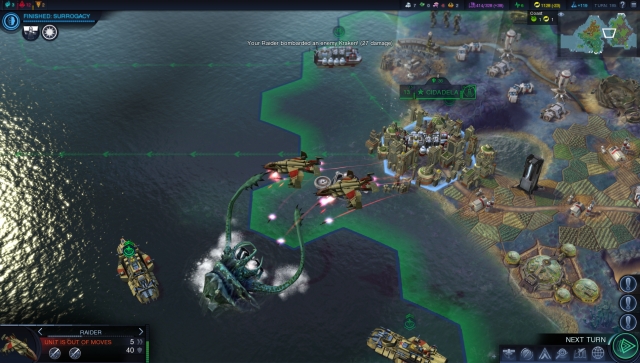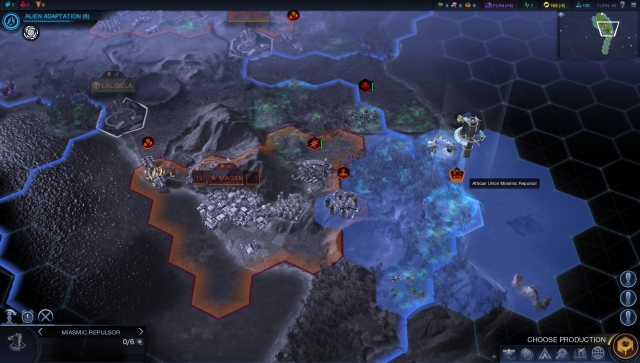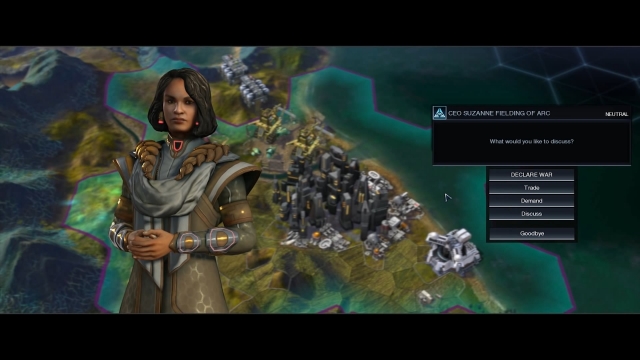
Sid Meier’s Civilization: Beyond Earth Review
Civilization in space. It’s a simple, self-explanatory boardroom pitch. You can probably imagine the folks at 2K licking their lips at the financial prospects, and following the success of Civilization V, who could blame them? Of course, for developers Firaxis it’s about more than just Civ in space, there’s a legacy here that stretches back to Sid Meier's Alpha Centauri, itself essentially a space edition of the core franchise. But then, for fans of the original sci-fi 4X title, it was so much more than that, it was a game that grew beyond anything the Civ franchise had managed up to that point. Today, Firaxis face the same challenge: how can they make this spin-off feel like more than a simple reskin of a tried and tested formula?
The short story is, they can’t. Like so many others, I was concerned, pre-release, that Civilization: Beyond Earth would be nothing more than a visual overhaul of Civ V. While there’s certainly plenty of cool new features and a vastly divergent overall tone, it’s difficult to shake the feeling that Beyond Earth really is just Civ V in space. So much of what made the 2010 game great is firmly in place here: the same brilliantly interlocked mechanics, the on-point visual design and the classic ‘one more turn’ addiction. I may have longed for a title that’s vastly different from Civ V, but there’s no doubt that the blueprints already in place were good enough to warrant further development. It’s probably cheaper that way too.

Everything has a new name, but what those things do hasn’t changed all that much. Gold is now energy, happiness is now health, the strategic resources are essentially the same only more spacey and civilisations are now sponsors. Science and culture remain science and culture though, supposedly those two things never change. Veteran players will therefore find themselves employing tactics that worked just as well in the old title. Balance changes mean you’ll have to adapt your strategies a little, but so long as you realise trade convoys are much more valuable this time, you’ll be fine. This familiarity may be somewhat disappointing for series fans who were hoping for something completely new, but rest assured that there’s enough here to keep you interested initially.
Of course, the sci-fi theme is the crucial difference and this does provide a cool overarching tone. Beyond Earth is cold and lonely in comparison to Civ V’s royal warmth and rich, vibrant colours. It’s difficult to describe accurately, but Firaxis has done a great job of giving the game a unique sci-fi feel that while not wholly comfortable, does a fantastic job of making the gameplay feel like a true last-gasp for humanity. The simple menu screen with nothing but a slowly rotating planet in the centre of a dark, starry, screen is an excellent example of this simple but effective presentation. I’m sure that many will dislike this minimalistic style, but I for one enjoyed how little details throughout the game developed this subtle ‘end of humanity’ vibe.

Once you’re into the main gameplay, however, it’s all a lot less subtle. Your first city literally drops in from a spacecraft into a land that, while familiar (in large part due to the use of the Civ V engine), is undoubtedly alien. Green ‘miasma’ litters the landscape, giant canyons cut up the land and the hexagonal tiles are a mess of strange terrain and unusual resources. No longer is your explorer a stone-age man but an astronaut with his own moon buggy. Where previous Civilizations have been about the progress of man over time, Beyond Earth is all about the development of humankind in relation to this mysterious planet. For those with a love for all things sci-fi, then the reskin will be, and should be, a key selling point.
One has to wonder, however, what makes Beyond Earth actually stand out aside from the sci-fi scenery. Don’t worry, there are a fair few features, even if they’re not all totally effective. The victory conditions are arguably the greatest deviation from Civ V (aside from the overall theme, of course). Rather than the direct victory paths of culture, military, finance, science and so on, Beyond Earth ties the win conditions more closely to choices the player makes during a game. You can still win by building up a giant army and taking over the whole map, but the new affinities provide different alleyways to win.

The affinities are an interesting mechanic purely because they’re one of the few totally original concepts in Beyond Earth. As your colony grows you’ll be making active decisions within the new quest system (which is self-explanatory), as well as choosing research, that steers your people towards one of three affinities. Harmony sees your civ develop a close relationship with the planet they’re living on, purity looks to maintain the old human ways of life, while supremacy strikes a balance between these two extremes. They each have their own path to victory but there seems to be an intentional decision from Firaxis to not make them too dissimilar.
They all task the player with a similar sequence of plays - research the right tech, build the right buildings, then wait for a certain number of turns for victory. That last part is so opponents can try to thwart your plans at the last moment, although the lacklustre AI rarely uses this time to good effect (more on this later). This means that gameplay is more focused on the development of your affinity than the actual end goal, at least to begin with. Victory is less about focusing on one specific resource within your nation, and more about using them in combination. It’s an interesting move, and definitely one of the primary features that stands Beyond Earth apart from Civ V. Whether that’s a good move in the long run will be revealed as the game moves out of the ‘launch buzz’ stage.

The affinities also link into one of Beyond Earth’s other primary departures. Because this title doesn’t have the benefit of a quickly evolving timeline, there’s no direct reason for military units to evolve as they do in the historical Civilization games. Slowly building up your stone-age warriors to elite infantrymen has always been a fun part of the game, so to maintain this satisfactory ‘evolution’ affinities are now used to upgrade your troops. Which of course means that each affinity has its own style of military weapon. The planet-hugging harmony followers have a cool alien look about them, while the supremacy followers rely on mechanoid humans. Every affinity has versions of the standard troops (soldiers, tanks, ships, artillery etc), as well as a couple of awesome special units.
It’s a clever system that ties unit development into the victory process, two elements that were once entirely separate unless you were going for a domination victory. Combat itself is almost exactly the same as with Civ V; the inclusion of orbital units that can unleash death from way, way above is a good addition, but nothing revolutionary. Battle has never been the calling card of Civilization, but it’s a shame that Firaxis didn’t even try to bring anything completely new to the table. There’s so much they could do with the sci-fi theme! I don’t know what, but that’s why I’m not a game designer.

That’s not the only element that disappointed me though. The AI in the series as a whole has never been particularly great - the only way it manages to defeat people is through massive in-game advantages. That’s practically unchanged in Beyond Earth, you’ll rarely be surprised by the AI decisions and almost everything it does is reactionary as opposed to genuinely strategic. Playing online is the obvious remedy for this, although the slow nature of online Civ games can be too much for some people - given the right group though, it’s still great fun to play against other humans. Due to the poor AI, however, diplomacy is also a bit of a flop. A new favours system is a fairly successful attempt at making other colonies more receptive to your instructions, but it can often feel more random than strategic.
The other AI influences are the much-touted aliens who essentially replace the barbarians of classic Civ. There’s been a lot of talk about the indigenous lifeforms being especially tricky to handle, but I didn’t encounter any problems whatsoever, even on the hardest difficulty. In fact, I found the aliens to be surprisingly easy to outmanoeuvre and outmuscle. One instance in particular highlighted to me their lack of power: in order to gain the harmony affinity victory you have to withstand a number of turns in which the aliens try to attack the ‘mind flower’ wonder. I built up a decent army in preparation for this event, only for 20 turns to go by without so much as a single alien unit in my lands. There’s a chance this was a bug (of the technical kind, sadly), but I’m pretty sure they were just too dead to mount an attack.

It’s funny, there’s a lot about Beyond Earth that I’m not too sure about and a fair number of mechanics that could be better. Yet it’s incredibly playable and just as addictive as every other Civilization game. It’s incredibly easy to lose a lot of time while playing, which is a testament to how the game can really get the player involved. It’s ever-present that the game has a tendency to force the player down a certain path, lacking the overall freedom of something like Europa Universalis IV. Yet when the path is as beautiful, thoughtful and fun as Beyond Earth, it’s not exactly a challenge to walk that path over and over again. It does indeed feel like a reskin of Civilization V, but it’s a skin that the game wears quite well.
Civilization: Beyond Earth (Reviewed on Windows)
This game is good, with a few negatives.
It’s funny, there’s a lot about Beyond Earth that I’m not too sure about and a fair number of mechanics that could be better. Yet it’s incredibly playable and just as addictive as every other Civilization game. It’s incredibly easy to lose a lot of time while playing, which is a testament to how the game can really get the player involved. It’s ever-present that the game has a tendency to force the player down a certain path, lacking the overall freedom of something like Europa Universalis IV. Yet when the path is as beautiful, thoughtful and fun as Beyond Earth, it’s not exactly a challenge to walk that path over and over again. It does indeed feel like a reskin of Civilization V, but it’s a skin that the game wears quite well.













COMMENTS